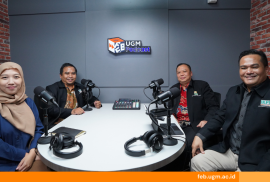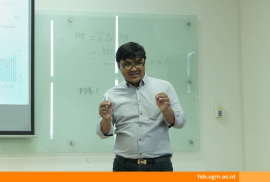Indonesia is one of world’s 50 most wasteful countries. Meanwhile, Japan External Trade Organization (JETRO) projects that the condition will be worse by 9.200 tons of waste production per day in 2025.
On the other hand, Central Bureau of Indonesia shows that the average waste management processed by Indonesian community is only about 10.28 percent in 2013. The number continues to decrease to 8.75 percent in 2014.
Concerned about the issue, three FEB UGM students took the initiative to conduct a research on waste disposing and sorting behavior. The students are Esa Azali Asyahid (Economics, 2015), Ega Kurnia Yazid (Economics, 2015) and Handoko (Economics, 2015).
Mentored by Gumilang Aryo Sahadewo, Ph.D., the three students studied the waste management behavior around the UGM Sunday Morning market area through the Student Creativity Program for Socio-Humanities Research held by Ministry of Research, Technology, and Higher Education.
Esa explained that Sunday Morning market was chosen by considering the abundance of waste in the area. The result of initial research showed that littering behavior without sorting the waste was due to the lack of information and negligence. “Based on the finding, we did an experiment by providing designed trash bins,” said Gumilang in a release received on Monday (7/16).
In the first experiment, they illustrated garbage according to the type of trash cans and created different holes for each type. In the second experiment, they set up a waste disposal motive by giving boards that said the sales of waste sorting would be donated to orphans. “The experiments showed an acceptable result. Garbage illustration and designed trans bins improved the accuracy of sorting waste from 27% to 35%,” he explained.
A similar thing also occurred with the set-up of instruction and information about the donation. These methods can improve waste sorting accuracy by visitors nearly doubled in comparison to the use of ordinary trash bins. “This proves that when people intend to help others, they tend to put more efforts in doing something,” said Esa.
The three students hoped that the outcome of their study can also be applied especially around the UGM compound. The main challenge is to build the appropriate waste management system. “Our findings focus on the behavioral aspect of visitors and a further study is needed on how the system and institutions could support waste management,” he concluded.
Source: Ika/UGM




